Research

Sep. 25, 2020
Remembering the Legacy of Dr. William Danforth
The passing of William H. “Bill” Danforth, M.D., last week at age 94 brought to the spotlight his work in academic administration, medicine and science, and outreach in the St. Louis area. His contributions also can be felt here at the University of Missouri. Dr. Danforth, chancellor emeritus of Washington University, was the founding chairman of the Donald Danforth Plant Science Center (DDPSC). Mizzou, including the Division of Plant Sciences in the College of Agriculture, Food and Natural Resources (CAFNR), and the Interdisciplinary Plant Group (IPG), has had a long partnership with the Donald Danforth Plant Science Center. In 1998…
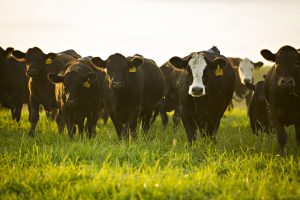
July 27, 2020
An Investment in Animal Reproduction Research
The United States Department of Agriculture’s (USDA) National Institute of Food and Agriculture (NIFA) recently announced an investment of $6.2 million in animal reproduction research. Nearly $1.5 million of that investment is coming to the University of Missouri College of Agriculture, Food and Natural Resources’ (CAFNR) Division of Animal Sciences. A total of 14 awards were handed out to 11 institutions, with CAFNR earning three of the awards. “This is an incredible achievement and showcases how strong our Division of Animal Sciences continues to be,” said Shibu Jose, associate dean in the CAFNR Office of Research. “We’re proud of each…

July 9, 2020
The Importance of Inland Fish
Inland, or freshwater, fish carry considerable economical, recreational and cultural value across the globe. Those species, which include trout, crappie and catfish, among many others, provide critical ecosystem services to communities worldwide – and are vulnerable to the impacts of climate change. A working group made up of researchers and scientists from the United States and Canada recently created an online database of academic papers related to the effects of climate change on inland fish. “Our primary focus was to provide a database of peer-reviewed, published papers on the effects of climate change on inland fish,” said Craig Paukert, adjunct…
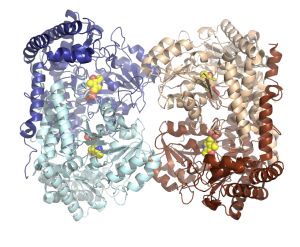
June 3, 2020
Fighting a Financially Taxing Pathogen
A unique collaboration between plant biologists and biochemists is looking to tackle the most financially taxing pathogen in the soybean industry. Soybean cyst nematode (SCN) is the most detrimental and costly pathogen affecting soybean production in the United States, with more than $1 billion lost annually due to SCN infection. Management of this pathogen relies on the use of SCN-resistant soybean cultivars, a strategy that has struggled in recent years due to nematodes showing resistance to those cultivars. Researchers at the University of Missouri and the University of Georgia recently published a paper related to an underutilized source of resistance…
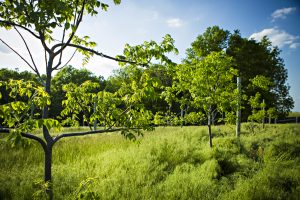
May 4, 2020
Contributing to Research
For more than 20 years, the Center for Agroforestry at the University of Missouri, has served as one of the world’s leading centers contributing to the science underlying agroforestry, which is the science and practice of intensive land-use management combining trees and shrubs with crops or livestock. Agroforestry practices help landowners to diversify products, markets and farm income; improve soil and water quality; sequester carbon; reduce erosion, non-point source pollution and damage due to flooding; and mitigate climate change. The Center for Agroforestry’s Chung-Ho Lin, an associate research professor, and his lab are currently looking at how to redirect…
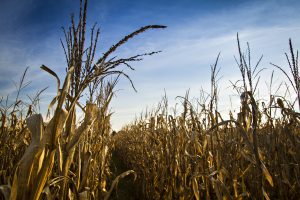
May 4, 2020
Gathering Preliminary Data
The U.S. Agricultural Market Outlook is prepared annually by economists with the Food and Agricultural Policy Research Institute (FAPRI) and MU Agricultural Markets and Policy (AMAP) and is updated each August. FAPRI Director Pat Westhoff said the report gives policymakers, farmers, agribusinesses and the public an overview of the state of the U.S. farm economy. The market projections it contains can be useful to farmers making production choices, to policymakers trying to decide how to respond to agriculture issues, to lenders who must decide whether to make loans and to agribusinesses making investment decisions. FAPRI released its most recent U.S.
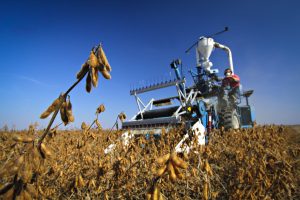
April 9, 2020
Moving the Agricultural Food Chain Forward
The Agricultural Experiment Station (AES) at the University of Missouri operates a system of Agricultural Research Centers across the state in an effort to meet the regional needs of agricultural producers and natural resource managers. With nearly 14,000 acres, these research and demonstration facilities host more than 35,000 people each year for field days, Extension activities and other community events. The various facilities play a vital role in the agricultural food chain in numerous ways, including seed variety trials, plant and animal breeding studies, and providing agronomic information. As research ramps down at MU due to the global COVID-19 pandemic,…
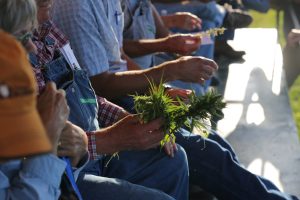
April 9, 2020
A Unique Opportunity
Last year, Missouri lawmakers passed a law that allowed producers to grow a crop that hasn’t been legal in the state in decades – hemp. The new law required that growers be licensed with the Missouri Department of Agriculture, and it also allowed universities to plant hemp right away to collect data for future plantings. Seven University of Missouri College of Agriculture, Food and Natural Resources Agricultural Research Centers planted a total of seven acres of hemp throughout the state. Those plantings happened from the end of June to early July. All were between half an acre and three acres.
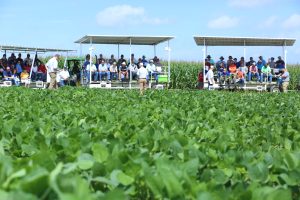
Aug. 30, 2019
An Investment in Agriculture
University of Missouri officials announced today a $6.5 million investment in the Missouri Agricultural Experiment Station of MU’s College of Agriculture, Food and Natural Resources. The investment will enhance the university’s ability to share next-generation agricultural technologies developed by MU researchers with Missouri’s farmers and ranchers. “CAFNR’s world-class animal and plant researchers use these centers to translate research from the laboratory and evaluate its impact under real field conditions,” MU Chancellor Alexander N. Cartwright said. “Because these projects oftentimes include an educational component, our students also use the research centers for essential field studies. Needless to say, these centers are…

June 27, 2019
Throwing New Light on Photosynthesis
In the summer months, Jeff Wood, a biometeorologist in the School of Natural Resources at the University of Missouri, likes to spend his days with his head in the clouds, or at least the canopies of forests. Sometimes starting before dawn and staying until dusk, he uses a 32-meter tall instrument-studded tower at the Missouri Ozark AmeriFlux site (MOFLUX) at the Baskett Wildlife Research and Education Center near Ashland, Missouri, to monitor the “breathing” of the forest. Using tools to measure the flow of carbon dioxide and water from the level of the individual leaf to the entire forest, he…